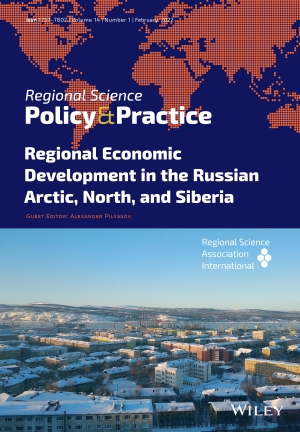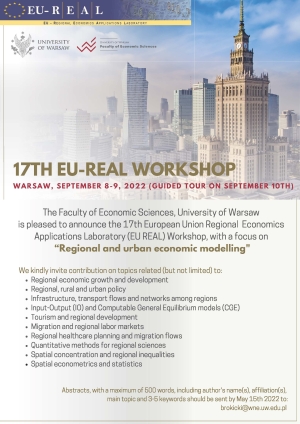Council
Elisabete Martins
Member features for June Issue of NARSC Newsletter

NARSC Update
Calling upon all North American Regional Scientists
As noted last year, we would like to feature the research and contributions to the field of regional science by our members each year in the June Issue of the NARSC Newsletter.
To ensure an inclusive process and broad representation, we invite you to nominate yourself or someone you know to be featured in the June 2022 NARSC Newsletter. Everyone is welcome! Nominees can be PhD candidates up to emeritus professors but need to be members of NARSC or one of its regional associations. We especially encourage nominations of researchers belonging to underrepresented groups in NARSC and their contributions to the field of regional science.
These will be short features that will consist of questions regarding your relationship to/involvement in NARSC, your research and how it contributes to regional science, and important future research directions by regional scientists in your subfield.
We hope to receive a lot of nominations! Depending on the number of nominations, we may have to make a selection based on the goal of having as many diverse voices as possible heard and at the same time keeping the newsletter to a reasonable length.
To nominate yourself and/or someone you know, please email Isabelle Nilsson (This email address is being protected from spambots. You need JavaScript enabled to view it.) your name (or the name of the person you are nominating), affiliation, and email address by April 1.
ERSA Summer School | Less than one week left to apply
|
REMINDER | Nominations to RSAI Fellows – Deadline: April 15, 2022
Dear RSAI members,
I hope this email finds you well.
I am writing you to remind you of the possibility to nominate a member of the Association as RSAI Fellow.
As discussed on the dedicated web page (https://www.regionalscience.org/index.php/awards/rsai-fellows.html), RSAI Fellows "are distinguished scholars with a proven and recognized research record in the field of regional science during a considerable part of their scientific career. Such honoured members of the RSAI are appointed after a careful nomination and selection procedure, based on a broad consultation of the RSAI membership." Let me remind you that every RSAI member in good standing can be nominated, although no self-nomination, or a nomination by another Fellow, is allowed. Candidatures will be screened by a dedicated committee, and elections will be subsequently made based on the votes of the RSAI Fellows.
The deadline for this year's nominations is set at Apr. 15.
Thank you all in advance for your attention,
Kind regards,
Call for applications | The Peter Nijkamp Research Encouragement Award
Call for applications
The Peter Nijkamp Research Encouragement Award
The award recognizes the outstanding potential of a mid-career researcher from a nation in the developing world in which there is a section of RSAI. Conditions for applications are:
- No more than 10 years from the doctoral qualification (by Dec 31, 2021);
- Live in developing nations continuously for at least three years as at Dec 31, 2021;
- Be a member of RSAI in good standing;
- Submit a written formal research paper on a topic in Regional Science;
- Submit an updated version of CV.
All material must be submitted to the This email address is being protected from spambots. You need JavaScript enabled to view it.
Nominees will be judged in part on the evaluation of the paper and in part on an evaluation of the research track record and performance (CV).
The winner(s) will receive support, up to 750 Euro, to participate in a Supra-Regional meeting or in the World Congress, at which the paper will be presented.
The jury will comprise the Immediate Past-President of RSAI as Chair, an Editor of Papers in Regional Science, and two RSAI Fellows.
Deadline for the applications: April 15, 2022.
Call for Abstracts | 16th NECTAR Conference, July 20-22 2022,Toronto (Canada)
16th International NECTAR Conference Toronto, Canada, 20 - 22 July 2022
Mobilizing Justice: Moving Toward Action for an Equitable Transportation Future
General Call for Papers – Extended Deadline
Transportation systems, networks, and infrastructure are the critical link that connects people to their daily social, economic, and health activities. However, the quantity and quality of transportation opportunities available vary significantly from place to place, and often lead to the phenomenon known as Transportation-Related Social Exclusion (TRSE).
The conference calls for presentations on advancements in the fields of transport, communication, and equity. The focus of the conference is transportation equity and TRSE, and how 21st century cities and regions are addressing these important topics in a post-COVID-19 world. For example, presentations may discuss how transport policies enable or prevent access to opportunities, present emerging ways of measuring transport-related disadvantage and its downstream effects, or explore the intersectional experiences of individuals with transportation systems and networks.
We invite papers discussing the following specific topics of interest:
- Economic, social, and health impacts of suppressed or excess travel
- The multiple dimensions of access to opportunities (barriers/constraints)
- Distributional impacts of transportation infrastructure investment
- Equity and environmental impacts of logistics and freight
- New transport technologies, curbside management, and equity
- Digital barriers to transportation and solutions
- Analyses of policy interventions on transportation equity and social inclusion
- Intersectional approaches to experiences and perceptions of people related to mobility and accessibility
- Professional or academic applications of theoretical approaches to equity (prioritarianism, sufficientarianism, egalitarianism, etc.)
- Innovative data collection to advance equity
In addition to these topics, we welcome papers on topics in the fields of transport, communications, and mobility at large. General topics of interest include transport and infrastructure evaluation, transport policy and environment, logistics and freight, tourism, recreation and leisure, housing and labour markets, accessibility analysis, social and health issues, and ICT.
The different NECTAR clusters will also organize specific thematic sessions. Calls for papers for these sessions will be posted on the conference website and the NECTAR website.
Deadline for abstract submission: March 14, 2022. Abstracts should be submitted electronically, using the form available on the conference website and following the instructions found there:
https://nectar2022.artsci.utoronto.ca
Criteria for acceptance
Criteria for acceptance are scope, scientific quality, NECTAR membership and the possibility to fit the presentation in a coherent conference session. We allow one paper presentation per participant.
Venue
The NECTAR conference will be organized by the University of Toronto and hosted on its downtown St. George campus. Founded by royal charter in 1827, the University of Toronto is Canada’s largest and top-ranked university, located in a growing global city with direct air connections to over 60 countries.
Participation and NECTAR membership
Registration, meals, and accommodation for one night will be offered to NECTAR members, for only one author per paper. One night of hotel accommodation will be offered to participants who have confirmed their participation before May 31, 2022. One night of hotel accommodation might be charged in case of late cancellations. All practical details will be communicated through the conference website. In order to participate in the conference, a consecutive and current two-year NECTAR membership is necessary (2021-2022). Non-members can find details of how to join the association on the “Membership” page of NECTAR’s website: www.nectar-eu.eu/membership.
COVID-19 considerations
For most travelers, entry into Canada requires proof of full vaccination. In addition, the University of Toronto requires proof of full vaccination for many activities that occur on campus. Please refer to the NECTAR 2022 conference website for up-to-date COVID-19 related requirements.
Important dates:
Abstract submission: March 14, 2022
Notification of acceptance: March 31, 2022
Confirmation of attendance: May 31, 2022 We look forward to seeing you in Toronto!
NECTAR is a European-based scientific association. The primary objective is to foster research collaboration and exchange of information between experts in the field of transport, communication and mobility from all European countries and the rest of the world. It is a multidisciplinary social science network bringing together a wide variety of perspectives on transport and communication problems and their impacts on society from an international perspective. For further information on NECTAR, use the link: http://www.nectar-eu.eu.
The Annals of Regional Science, Volume 68, Issue 1 - New Issue Alert
|
|
||
|
|
|||
|
|
|
|
|||
|
|
|
|
|||
|
|
|
|||
|
|
|
|||
|
|
|
|
|||
|
|
|
|||
|
|
|
|||
|
|
|
|||
|
|
|
|
|||
|
|
|
|||||
ERSA Monthly E-news - February 2022
|
|
|
|
|
|
|
|
|
|
|
|
|
|
|
|
|
|
|
|
|
|
|
|
|
|
|
|
|
|
|
|
|
|
|
|
|
|
|
|
|
|
|
|
|
|
|
George Mason University | Don E. Kash Postdoctoral Fellow in Science and Technology Policy (gmu.edu)
(i) a list of three professional references with contact information; and
(ii) the application document consisting of the four required sections listed below (to be uploaded as Other Doc).
- Biographical Sketch not to exceed two pages. The biographical sketch must include the information to certify the applicant’s eligibility.
- Project Summary: Abstract of fellowship activities, not to exceed one page. The project summary must include the following:
- Overview, which must include (1) the candidate’s name; (2) the date the degree was, or will be, completed; and (3) basic disciplinary field(s) involved in the project;
- A summary of the research plans and goals;
- A summary of the training plan for career development and educational or public outreach.
- Project Description, not to exceed seven single-spaced pages, must include the following information:
- Part I – Research Plan: (up to five pages), which should include: (1) a theoretically-grounded introduction or background section and (2) a statement of research objectives, methods, and significance.
- Part II – Training Plan (up to two pages), which should include: (1) training objectives and the plan for achieving them (these may include scientific as well as other career preparation activities); (2) an explanation of how the fellowship activities will enhance the candidate’s career development and future research directions; and (3) a timetable for quarterly goals with benchmarks for major anticipated outcomes.
- References Cited, listed in a format such as APA or other standard format (no page limit)
More information at: George Mason University | Don E. Kash Postdoctoral Fellow in Science and Technology Policy (gmu.edu)
The latest issue of Regional Science Policy & Practice are available! Volume 14, Issue 1, February 2022
Dear All
The war in Ukraine is an alarming case of aggression between people and places. To build up peace, it's our duty as regional scientists to understand the causes and effects of this degradation of human interaction within space. I invite you to submit your thoughts, methods, evidences, policy evaluations and recommendations to the coming issue “Ukraine: Geopolitical Realities and Regional Development Perspectives” Submissions are due by 31 May 2022. http://www.regionalscience.org/index.php/news/journals/item/2968-call-for-special-issue-and-rspp-workshop-ukraine-geopolitical-realities-and-regional-development-perspectives.html
|
Regional Science Policy & Practice Pages: 1-207 February 2022 Issue Edited by: Alexander Pilyasov |
ISSUE INFORMATION
![]() Free Access
Free Access
Pages: 1-2 | First Published:22 February 2022
INTRODUCTION
Regional economic development in the Russian Arctic, North and Siberia
Alexander Pilyasov
Pages: 3-6 | First Published:22 February 2022
ORIGINAL ARTICLES
Leonid A. Bezrukov
Pages: 7-26 | First Published:09 May 2020
Prospects for modernization of regional economies in remote regions of Far North‐East Russia
Natalya V. Galtseva, Oksana S. Favstritskaya, Olga A. Sharypova
Pages: 27-47 | First Published:08 May 2020
Impact of migrations on the demographic structures transformation in the Russian North, 1939–2019
Viktor Fauzer, Tatyana Lytkina, Andrey Smirnov
Pages: 48-62 | First Published:28 September 2020
Nadezhda Zamyatina, Ruslan Goncharov
Pages: 63-85 | First Published:05 January 2021
Arctic supporting zones: mechanisms of formation and functioning
Tamara Dmitrieva, Oleg Buriy
Pages: 86-98 | First Published:17 March 2020
Alexander Pilyasov, Varvara Molodtsova
Pages: 99-126 | First Published:10 March 2021
Valeriy Kryukov, Anatoliy Tokarev
Pages: 127-146 | First Published:25 June 2021
Attracting highly skilled migrants to the Russian regions
Vera Barinova, Sylvie Rochhia, Stepan Zemtsov
Pages: 147-173 | First Published:31 August 2021
Alexey Naumov, Daria Sidorova, Ruslan Goncharov
Pages: 174-186 | First Published:22 February 2020
Vladimir G. Loginov, Margarita N. Ignatyeva, Ilia V. Naumov
Pages: 187-202 | First Published:05 November 2020
BOOK REVIEWS
Great minds in regional science
Roberta Capello
Pages: 203-204 | First Published:19 November 2021
The Party and the People: Chinese Politics in the 21st Century
Amitrajeet A. Batabyal
Pages: 205-207 | First Published:08 December 2021
17th EU-REAL Workshop Warsaw, September 8 - 9 , 2022
17TH EU-REAL WORKSHOP
WARSAW, SEPTEMBER 8 - 9 , 2022 ( GUIDED TOUR ON SEPTEMBER 10 TH)
The Faculty of Economic Sciences, University of Warsaw is pleased to announce the 17th European Union Regional Economics Applications Laboratory (EU REAL) Workshop, with a focus on “Regional and urban economic modelling".
We kindly invite contribution on topics related (but not limited) to:
- Regional economic growth and development
- Regional, rural and urban policy
- Infrastructure, transport flows and networks among regions
- Input-Output (IO) and Computable General Equilibrium models (CGE)
- Tourism and regional development
- Migration and regional labor markets
- Regional healthcare planning and migration flows
- Quantitative methods for regional sciences
- Spatial concentration and regional inequalities
- Spatial econometrics and statistics
Abstracts, with a maximum of 500 words, including author's name(s), affiliation(s), main topic and 3-5 keywords should be sent by May 15th 2022 to: This email address is being protected from spambots. You need JavaScript enabled to view it.
About Us
The Regional Science Association International (RSAI), founded in 1954, is an international community of scholars interested in the regional impacts of national or global processes of economic and social change.






 We are looking for smart young researchers willing to learn, present their research and get precious feedback from our outstanding speakers' line-up
We are looking for smart young researchers willing to learn, present their research and get precious feedback from our outstanding speakers' line-up



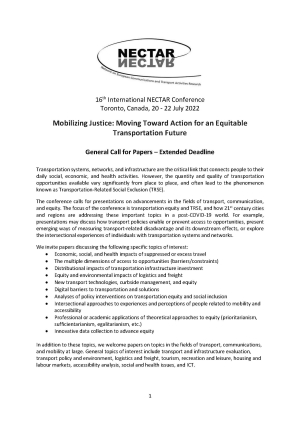
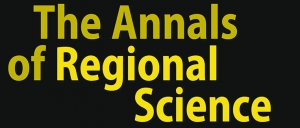
 The Annals of Regional Science.
The Annals of Regional Science. 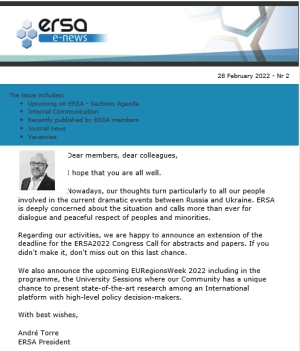
 Dear members, dear colleagues,
Dear members, dear colleagues,
 ONLY 10 Days Left!
ONLY 10 Days Left!


 Scienze Regionali – Italian Journal of Regional Science: Webinar
Scienze Regionali – Italian Journal of Regional Science: Webinar





 The German Speaking Section (GfR
The German Speaking Section (GfR
 The Turkish Section (BBTMK
The Turkish Section (BBTMK
 Francisco Rowe is the new Managing Editor of REGION!
Francisco Rowe is the new Managing Editor of REGION!



